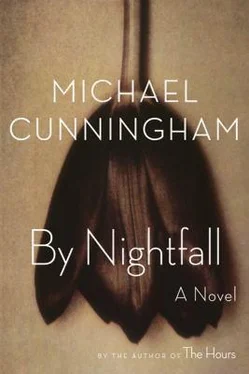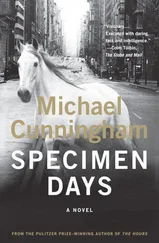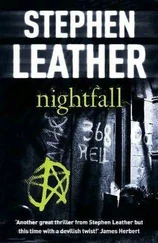They watch 8½, which is as good as it’s always been, polishing off a third bottle of wine as they do. They are, for the duration of the movie, a family right out of a TV commercial, three people on a sofa watching raptly as the living jewel of the television screen takes them out of their lives and delivers them into new ones. Marcello Mastroianni putts off on a motorbike with Claudia Cardinale clinging to his back, Marcello Mastroianni leads a conga line of everyone he’s ever known at the base of a dead rocket ship.
When the movie is over, Rebecca goes into the kitchen to get dessert. Peter and Mizzy sit side by side on the sofa. Mizzy puts a comradely arm around Peter’s shoulders.
“Hey,” he says.
“Love that movie,” Peter says.
“Do you love me?’
“Shh.”
“Just nod, then.”
Peter hesitates, nods.
Mizzy whispers, “You’re a beautiful dude.”
A beautiful dude? What kind of word is dude for a boy like Mizzy to be using?
Answer: it’s a young word, it’s a young man word, and for a moment Peter can see how they’d be together—teasing, knowing, fractious in a (mostly) good-natured way, a wised-up and roughhousing pair out of some romantic and implausible ancient Greece. Mizzy is heedless, unashamed about declaring his love on his sister’s sofa. Could they be happy together? It’s not out of the question.
Peter says, softly, “I am not a dude.”
“Okay, you’re just beautiful.”
Peter is, to his embarrassment, happy to be told he’s beautiful.
And then, Rebecca appears with the desserts. Coffee and chocolate gelato.
They finish the gelato, talking desultorily, and then they go to bed. Peter and Rebecca do. Mizzy says he’s going to go into his room and stay up a little longer, reading The Magic Mountain, and so with mild unyearning good nights he trudges off with his heavy tome, old Thomas Mann himself, the patron saint of impossible loves.
Once they’re in bed together, Peter and Rebecca lie chastely side by side, on their backs. They keep their voices low.
Rebecca says, “Do you think he had a good time today?”
You have no idea.
“Hard to say,” Peter answers.
“It’s sweet of you.”
“What is?”
“To put up with him like this.”
Oh, God, don’t thank me.
“He’s a good kid.”
“I’m not honestly so sure that he’s a good kid. He has a good heart. And, you know. I’m stuck with him.”
Yeah. Tell me about it.
Now is probably the time—now is quite possibly the last time—to tell her he’s doing drugs again. That would, in its way, solve the problem, wouldn’t it? He could have Mizzy shipped off to rehab, just by saying the word. He knows how it would go. Mizzy is exhausting the local patience, and Rebecca is thoroughly capable of decisive action. Peter could effect—just by saying the right thing, right now—a benign assassination of sorts: Peter could join the adults, and be rid of Mizzy, who would have two choices only; who could submit to his sisters’ ministrations (Julie would be on the next train from Washington, hard to say whether or not Rose would fly in from California) or run off and live or die on his own. There is, clearly, no room for compromise anymore. The girls have had it.
Peter says, “We’re both stuck with him.”
And so, he knows. He wants, he needs, to do the immoral, irresponsible thing. He wants to let this boy court his own destruction. He wants to commit that cruelty. Or (kinder, gentler version) he doesn’t want to reconfirm his allegiance to the realm of the sensible, all the good people who take responsibility, who go to the right and necessary parties, who sell art made of two-by-fours and carpet remnants. He wants, for at least a little while, to live in that other, darker world—Blake’s London, Courbet’s Paris; raucous, unsanitary places where good behavior was the province of decent, ordinary people who produced no works of genius. God knows, Peter is no genius, and Mizzy isn’t, either, but maybe the two of them could wander off the map a little, maybe it’s what he’s been waiting for, and because life is, as they say, full of surprises, it’s arrived not in the form of a great young artist but in the form of a young male version of Peter’s wife, his wife when she was by all accounts the most sought-after girl in Richmond; a girl who could throw down the lunk who’d humiliated her sister and have her way with him. She is wonderful, but she is no longer that girl. Here, practically cupped in Peter’s outstretched hands, is youth, wanton and self-immolating and scared to death; here is Matthew fucking half the men in New York; here is the Rebecca who no longer exists. Here is the terrible, cleansing fire. Peter has been too long in mourning, for the people who’ve disappeared, for the sense of dangerous inspiration his life refuses to provide. So, yes, he’ll do it, yes. He and Mizzy will not, cannot, lock lips again, but he’ll see where this takes him, this dreadful fascination, this chance (if “chance” is the word for it) to upend his own life.
Rebecca says, “I just want to be sure you know I’m grateful. You didn’t sign up for this when you married me.”
“I did, though. I did sign up for it when I married you. This is your family.”
And, really, Peter married her family, didn’t he? That was part of the attraction, not only Rebecca but her past, her lovely Fitzgeraldian history, her eccentric and peculiar people.
“Good night,” she says.
She settles in for sleep. There is no denying her beauty, or the force of her being. Peter is struck by a pang of envy. Sure she has her worries, but she inhabits herself so fully, she worries over the real questions and ignores the theoretical ones; she slices through the world. Look at her pale, aristocratic forehead and the firmness of her brow. Look at the modest parentheses of lines that bracket her mouth—she’d laugh at the idea of collagen. She will age bravely and do good work in the difficult world and love the people she loves with direct, unwavering ferocity.
So it seems there will be no comeuppance for his modest betrayal at dinner, the little flurry of juvenile jokes about art in Montana. She is (is she?) sniffing around at a betrayal of far greater magnitude.
“Good night,” replies Peter.
He dreams that he’s pissed somewhere in the gallery (oh, the shameless unconscious) and he’s trying to clean it up before anyone sees it, but of course he can’t find the piss, he just knows it’s there. Somewhere. He wakes, settles back into a semidream in which a strange woman whom he understands to be Bette Rice tells him, They all left years ago, which when he returns to wakefulness feels less like a dream than a rampant, unanchored thought. It’s only two fifteen, not even the insomnia hour. Still, he gets up for his drink and his pill. In the living room… Crazy to have wondered even briefly if Mizzy might be waiting for him, naked, and how gay is it, how gay isn’t it, for Peter to want to see him that way again, as Rodin would have done him, the muscular springiness of that young body, the blue traceries of vein under pale pink skin, the wonky eyes and stubby feet. No, Mizzy’s in bed. On the other side of the door… What? No sound, can Mizzy sleep? Fuck him if he can. Should Peter go in? Of course he shouldn’t. He pours himself the vodka, gets the pill from the medicine cabinet, goes to the window, and there, how can it be, is the guy on the fourth floor across the street, the one he’s never seen, at his fucking window, this must be his hour. He’s fully visible, lights on in his living room. He’s an older man, maybe seventy-five, with a cloud of white hair wafting around his pink skull. He’s wearing a blue T-shirt and what appears to be (he’s cut off just below the waist) pajama bottoms. Not a heroic figure, jut of gut almost pressed against the window glass, drinking from a big ceramic mug. Is there, could there be, some plan here, some goddamned design, I mean why tonight of all nights has Peter finally come face-to-face in a manner of speaking with his wakefulness mate? No, Peter’s just up and at the window earlier than usual, he’s crossed over into the other guy’s insomnia pattern. He can’t tell if the older man sees him, how could he not, but there’s no acknowledgment, Peter wouldn’t expect a wave (not in New York, not between two men in states of partial undress) but a nod maybe, or a minor repositioning that would signify recognition. Nothing, it’s as if Peter isn’t here at all, and it occurs to him (is this the pill taking effect already?) that he may in fact be invisible, that he may be his own ghost, dead in his sleep, risen invisibly to watch himself at seventy-plus, still standing at a window in the deep of the night. Maybe the dead don’t understand that they’re dead. That, of course, is just a fantasy, would that the pills provided waking dreams or anything but their drowsy pull… But still, here he is, finally, after how many years, the other, the doppelganger, awake in his own world, maybe he, too, has a wife who’s an Olympian sleeper, and Peter can’t help wondering—old age attained, and you’re still looking out a window onto the orangey emptiness of Mercer Street? Shouldn’t you be… where? In Paris? In a yurt on the northern Pacific coast? And what, in either of those places, would prevent you from looking out longingly (does he long, and if so, for what?) into the night?
Читать дальше
Конец ознакомительного отрывка
Купить книгу












